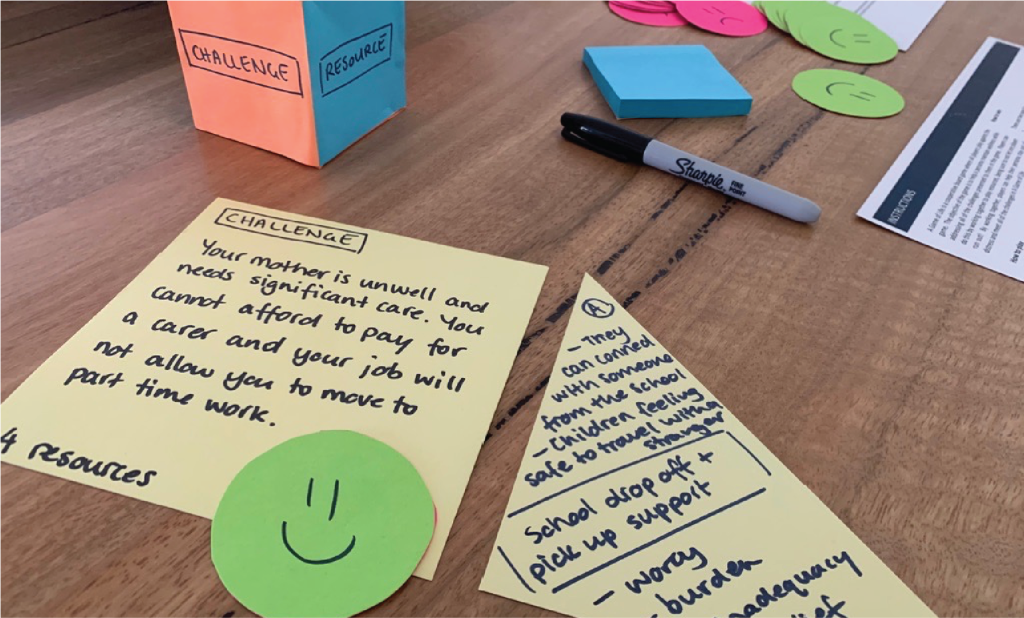Financial security collaborative board game & research toolkit development
#gamedesign #participatoryresearch #inclusiondesign #designresearch #codesign #socialimpact #systemsmodelling

Industry: Community Services & Financial Counselling
Role: Strategic Designer
No. stakeholders: 8
summary
- Conducted a short-term action design research program exploring ways to make discussions about retirement and financial wellbeing more welcoming and productive for older Australians entering retirement.
- Developed and tested a co-operative board game as a research tool to safely engage vulnerable stakeholders in discussion about taboo and sensitive topics.
- Partnered with the WA Financial Counselling Network to test the board game and elicit insights on novel ways to support elderly Australian’s experiencing financial hardship.
- Designed two prevention intervention strategies from the findings of the research to better support vulnerable older Australian’s more easily seek financial support.
the ask
With the introduction of the Superannuation Guarantee in 1992, Australia’s retirement model has shifted towards more personal responsibility for financial decision making (Agnew 2013). Despite this shift, many Australians do not adequately prepare for retirement (Agnew 2013). According to the Australian Bureau of Statistics, the percentage of Australians entering retirement age with large mortgage debts has increased to 47% (Australian Bureau of Statistics 2015) and the aged care pension is still the main source of income for retirees (Australian Bureau of Statistics 2020).
Research shows that there are a growing number of people who despite having seemingly sufficient financial, housing, and pension assets at the time of retirement, struggle to maintain this position due to negative health shocks, changes in real estate and financial equity prices, and public policy programs (Wallace, Haveman & Wolfe 2017). Additionally, trends show that financial matters are discussed less with family and friends as people get older (National Seniors Australia 2018), with strong avoidance by older Australians to seeking financial advice or support (Van Dalen, Henkens & Hershey 2017).
In considering the challenges faced by older Australians in both navigating life’s challenges and the increasingly complex aged care system, the project aimed to investigate what can be done to better support older Australian’s financial wellbeing, specifically:
- How might we make discussions about retirement and financial wellbeing more welcoming and productive?
- Where are the opportunities for early intervention in supporting the financial wellbeing of retirees?
the approach
Following an action research and design approach, this project applied creative design research activities to explore what stops people from seeking help and what might make conversations about financial wellbeing easier. A scenario based cooperative game was chosen as the core engagement activity for this project to explore the lived experience of people attempting to maintain their financial wellbeing in a safe and engaging way – how do they navigate life’s challenges, who do they seek help from, what questions do they ask and how do they feel? The guiding hypothesis of the research was that a better understanding of the lived experience of people may offer greater insights on how we can make it easier to talk about financial matters and thus better support older Australians as they move into retirement.
the work
the outcomes
- Partnered with the WA Financial Counselling Network to test the board game and elicit insights on novel ways to support elderly Australian’s experiencing financial hardship.
- The logic and flow of the game worked well, participants were able to contribute novel ideas and insights to the challenges presented in the game. The inclusion of challenges generated rich discussion around the lived experience of older Australians and the use of a game persona increased the physiological safety of the discussions.
- Insights were easily captured by participants with minimal external facilitation increasing the authenticity and flow of stories being shared. The data was easily transcribed into excel for analysis and the application of the tool as a research tool was successful.
- The game proved to be an interesting learning opportunity for the Financial Counsellors themselves who were able to leverage the experience of the other participants and learn new ways to help her clients.
- Designed two prevention intervention strategies from the findings of the research to better support vulnerable older Australian’s more easily seek financial support.
learnings
- Tactile tools that encourage play are immensely powerful at helping people discuss emotionally charged topics with greater ease.
- To truly empower people, they must first be seen as the experts in their own lives. We need research tools and design approaches that go beyond co-design and instead honour the people we serve as the subject matter experts in whatever we are designing.
- The true value of design is not always in the output or innovation, but in the conversations and connections that the design process creates.
- Because a person’s needs are always in context of their environment and the people around them, we need more sophisticated ways of relating to people through the research process.